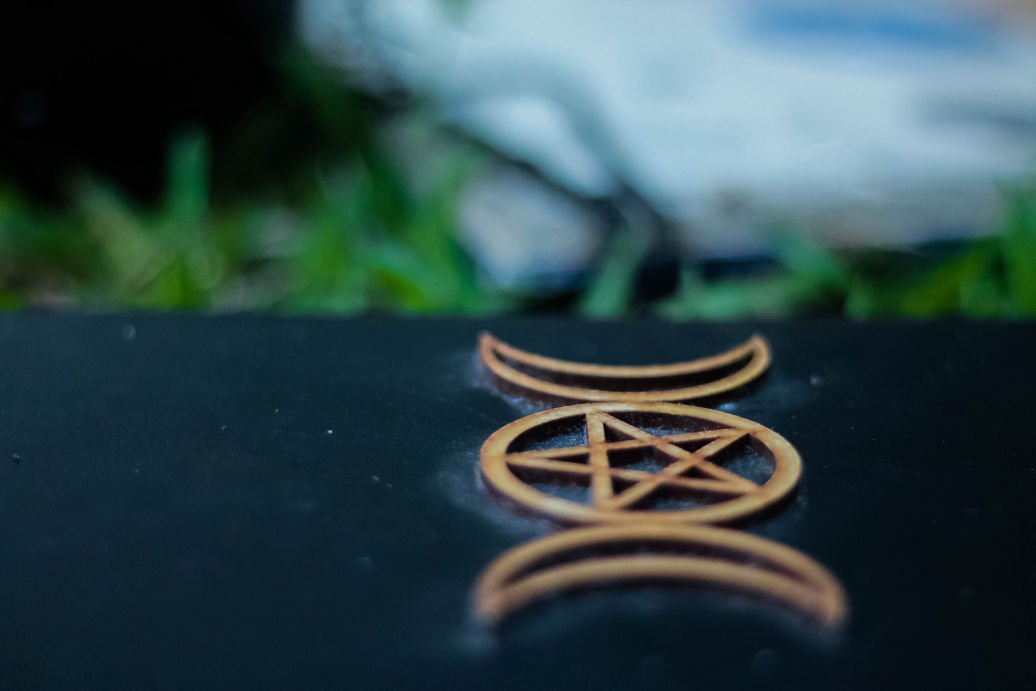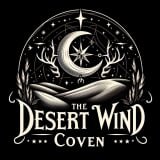It is also the practice (or the "craft") of magic. As we have seen, "wicca" may have come from a word that mixes elements of religion and magic in equal parts. Why is this so important? Because it underscores the idea that religion and magic are not mutually exclusive, that they can exist side by side harmoniously: that religious people can use magic to improve their lot, and that people who use magic can be spiritual, religious, "good" people. Academics had long tried to drive a wedge between religion and magic. This can be traced back to the pioneering work of Sir James Frazer and The Golden Bough. Although modern occultists may honor him for codifying the "laws" of magic, he had another agenda. Like most social scientists of his day, he was overwhelmed by Darwinian thinking and began applying evolutionary theory to everything, even to areas where it didn't fit. Consequently, magic, in Frazer's view, was nothing more than a debased precursor to "true" religion. As he saw it, the evolution went something like this: Mankind started with a flawed version of cause and effect, called sympathetic and contagious magic. Then, as he evolved, he became animistic, invoking the spirits that inhabit every river, tree, and rock. Then, as he became still more enlightened, he became polytheistic, believing in many Gods and Goddesses, each with different functions. Finally, as man evolved into the paragon of reason that he is today (sic!), he became monotheistic, realizing there could be only One True God.
Granted, this model was quickly dismantled, at least in academic circles. Theodore Gastor, professor of comparative religion, took Frazer to task for this idea, in his preface to a newer critical edition of Frazer's The Golden Bough. Gastor rightly points out that even the most "primitive" magician does not typically perform magic without invoking a God or Goddess. And in even the most "sophisticated" monotheistic religions, there is still a goodly amount of magic, although it may be re-christened as "liturgy" and "prayer". (In the West, the Catholic Mass is the parade example of magic as liturgy.) In fact, Gastor goes on to posit that religion and magic are inescapably found together throughout all cultures of the world, throughout all periods of history. Although academics have accepted this revision, non-specialists have been slower to catch on, and the Frazerian model still holds sway for many. It especially appeals to those "sophisticated" monotheists who believe they have already attained the zenith of theological ideals, and that the practice of magic could not possibly have a place in it. Apparently, there are even some new "Wiccan" groups that buy into this, seeing themselves as religious only, and holding themselves above such practices as magic.
To sum up, it seems that the current drive to separate Wicca from Witchcraft, to say that one refers to religion while the other refers to magic, is full of "Frazerian residue". It appeals to those who are uncomfortable with the thought that religion and magic can happily co-exist. (I suspect that it appeals mainly to Witches who are recent converts from monotheistic creeds, yet have ported a certain amount of their previous belief system into their new faith.) Yet both historically and linguistically, it can be shown that Witch and Wicca are the same word, and that they both mean the same thing, a combination of religion and magic. I am perfectly aware, however, of something that linguists call the "etymological fallacy", i.e. that a word means its etymology. We all know that the meaning of words can change over time. Maybe this has already happened to the word Wicca. Maybe too many people have too often repeated the newborn platitude, "Wicca and Witchcraft are not the same thing." Perhaps it is already too late to turn the tide of opinion. Nonetheless, supporting this view would be a catastrophic mistake for a religion like ours. And more to the point, it could be politically dangerous.
It wasn't long ago that Witches were sometimes arrested for the "crime" of "fortune telling", e.g. for reading Tarot cards, etc. In many such cases, Witches were able to mount a successful defense by arguing that such magical practices were part of their religion. However, I can envision a scenario in the not-too-distant future where the prosecutor will counter with, "That's not true! Her religion may be Wicca, but she was merely practicing Witchcraft!" In a culture like ours, in which all magic is seen as suspect by the increasingly political majority religion, it is perilous to allow a dark line to be drawn between religion and magic. Words like Witch and Wicca present us with a unique opportunity to erase that line. These words are the linguistic equivalent of a petri dish in which the cultures of religion and magic have been allowed to mix in equal proportions. I believe it is important for us to champion this unique mix of beliefs. When I first embraced Witchcraft as my path, I knew I was embracing both a religion and a practice of magic. Therefore, I will continue to proclaim that I am a Witch, and I am Wiccan, for it means the same thing. It is my religion, and it is my craft. It is my life.
Document Copyright © 1983 - 2009 by Mike Nichols.
Permission is given to re-publish this document only as long as no information is lost or changed, credit is given to the author, and it is provided or used without cost to others. Other uses of this document must be approved in writing by Mike Nichols.
Addendum:
First of all, many thanks to the literally hundreds of you who took the time and trouble to email me following the publication of this article at The Witches' Voice web site. To my great shock and surprise, about 80% of that response was supportive. (Of course, maybe those who disagreed with my views were less inclined to write.) Of the remaining 20%, three questions turned up with such regularity that I thought I'd better address them in an addendum here.
Many of my correspondents seemed to think the words "witchcraft" and "magic" are synonyms. Hence, they would ask, "Well if Witchcraft=Wicca, what do you call someone who practices magic, and yet is not Wiccan? Or a Witch?" Oddly enough, I call them magicians. Which seems kind of self-evident to me. Using the word "witchcraft" as a synonym for "magic" is linguistically quite recent. For example, the first occurrence of using the word "witchdoctor" to describe an African tribal shaman wasn't until the 1860s! So I restrict the use of the word-group Witch/Witchcraft/Wicca/Wiccecraeft, to northwestern Europe, where it originated and had its original referents. When I find magic being practiced in other cultures, I call it magic. Although my true preference is to call it by its own native word, whether Voudoun, Santeria, or whatever.
Many people wrote to insist that they practice magic in a non-religious way. (Many cited ceremonial magicians as a good example of this –although ceremonial magicians are awfully fond of invoking archangels!) In my article, I have argued that it is nearly impossible to practice magic in a non-religious way. Bear in mind that I am using the word "religion" in its most universal sense, as a scholar of comparative religion uses it. Folk religion does not require the worship of (or even the belief in!) a god or goddess. Simply to honor your ancestors by perpetuating their ways of doing magic would qualify most Family Traditions as "religious" from an Eastern perspective. About the only way one could do magic in a "non-religious" way is to make it up out of whole cloth! But even then, I'd bet dollars to doughnuts that one would end up "borrowing" symbols from one's cultural background, and that takes us back to "religion" again.
Finally, some practitioners of traditional British Witchcraft wrote to say they avoid the use of the word "Wicca" because it represents, to them, a Gardnerian-influenced, and diluted version of what they themselves practice. I sympathize with this concern and can only say that the word "Wicca" belongs to us traditionalists just as much as the word "Witch" does, because it is ultimately the same word, and it was there first. If those who dilute our praxis have tried to make the word "Wicca" uniquely their own, then it is high time we re-claimed it!
I hope this answers a few of the objections raised against my original article, and perhaps articulates some of the unspoken assumptions that undergirded it.

